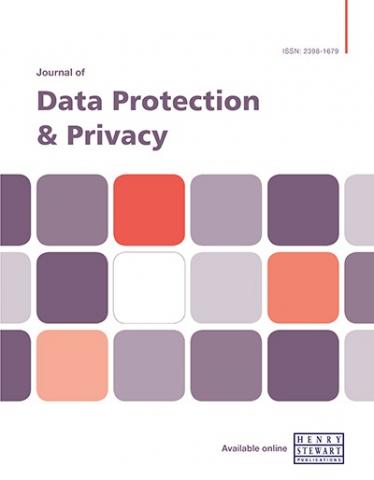“We want to create a space where data protection professionals across the world feel connected through the Journal of Data Protection & Privacy and our specialist interest group on LinkedIn. I also want to reach out and engage with the next generation of leaders in our profession and actively encourage them to share their knowledge and understanding of the subject for the benefit of our expanding – and highly influential – community across the world.”
Data loss prevention as a privacy-enhancing technology
Click the button below to download the full text of the article.
Abstract: Data loss prevention (DLP) is a mature technology deployed by many enterprises to support information security requirements. Key characteristics of DLP also make it a powerful privacy-enhancing technology that can satisfy a wide range of information-privacy requirements. In essence, DLP is a set of integrated technologies that detect sensitive data and prevent unauthorised use, release or delivery to specific destinations or recipients, as well as their storage at prohibited locations. DLP works in real time to identify personally identifiable information and react to privacy risks based on data content and the dynamic context of the information environment. Thus, DLP provides technical enforcement of terms and conditions, or policies more generally, to prevent privacy leaks. This paper provides an overview of the main features and elements of DLP.
Keywords: content analysis; context analysis; data at rest; data in motion; data in use; data leakage prevention; data loss prevention
William Stallings is an independent consultant and author of Information Privacy and Privacy by Design (Pearson, 2020). Bill has written numerous textbooks on cybersecurity, cryptography and computer networking (williamstallings.com), including Effective Cybersecurity: A Guide to Using Best Practices and Standards (Pearson, 2019) and Cryptography and Network Security, Principles and Practice, Eighth Edition (Pearson, 2020). He has 12 times received the award for the Best Computer Science and Engineering Textbook of the Year from the Textbook and Academic Authors Association. Bill created and maintains the Computer Science Student Resources site at ComputerScienceStudent.com. This site provides documents and links on a variety of subjects of general interest to computer science students (and professionals). He is a member of the editorial board of Cryptologia, a scholarly journal devoted to all aspects of cryptology. Bill holds a PhD from the Massachusetts Institute of Technology (MIT) in Computer Science.



